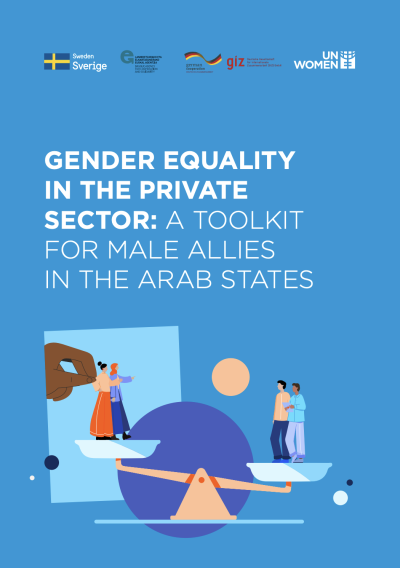
- Report year:2025
- Organisation: UN WOMEN
Unequal care responsibilities can further slow down women’s career advancement. Bias in the workplace and a lack of awareness are another roadblock that underscores why only 11 % of women comprise manager positions in the Arab region. Gender-inclusive workplaces and strategies to mitigate bias – supported by strong male allies – are needed to drive the private sector’s efforts in eliminating bias from process like the hiring, recruitment and promotions.
This toolkit begins by introducing workplace bias, and some of the opportunities and challenges for addressing it using a practical strategies and approaches. It then takes the reader through what we define as a robust framework and checklist for true male allyship in action, and gives guidance and best practices on both identifying patriarchal workplace culture and shifting behaviors. Finally, the toolkit ends by highlighting a few key priority areas for male allies to focus their support and energy to pave the way for more inclusive workplaces for men and women alike.
The private sector has a responsibility to shape this new landscape through gender-equitable leadership and leadership choices by male allies that advocate for
gender equality and women’s empowerment. We invite the private sector to utilize this manual as it continues to build modern organizations with cultures and policies that allow all of their people to thrive.
This toolkit begins by introducing workplace bias, and some of the opportunities and challenges for addressing it using a practical strategies and approaches. It then takes the reader through what we define as a robust framework and checklist for true male allyship in action, and gives guidance and best practices on both identifying patriarchal workplace culture and shifting behaviors. Finally, the toolkit ends by highlighting a few key priority areas for male allies to focus their support and energy to pave the way for more inclusive workplaces for men and women alike.
The private sector has a responsibility to shape this new landscape through gender-equitable leadership and leadership choices by male allies that advocate for
gender equality and women’s empowerment. We invite the private sector to utilize this manual as it continues to build modern organizations with cultures and policies that allow all of their people to thrive.
